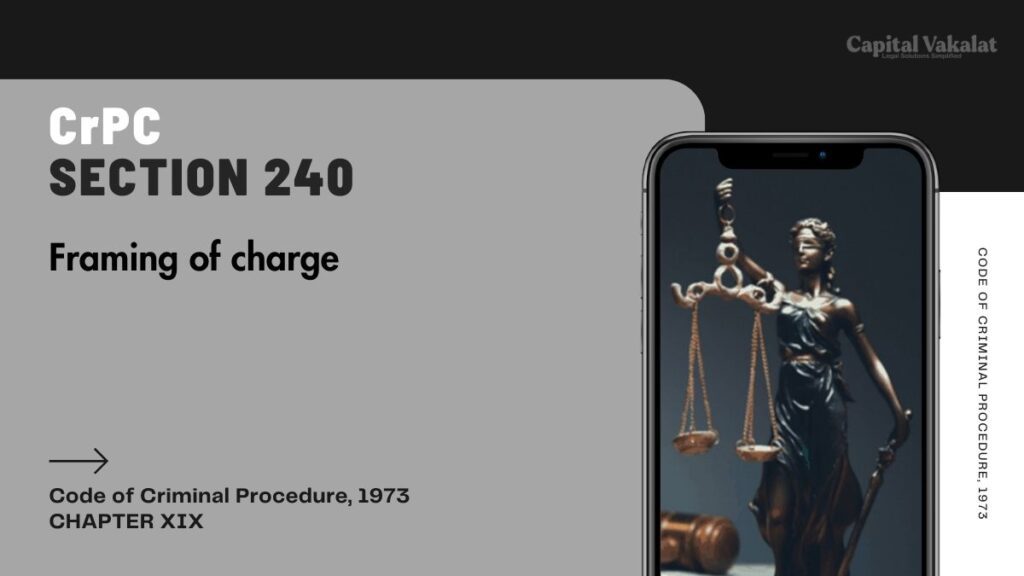The Code of Criminal Procedure (CrPC) serves as a cornerstone for the Indian legal system, ensuring a structured and fair process for criminal proceedings. Among its critical components is Section 240 CrPC, which delineates the process of framing charges against an accused.

This step is pivotal, as it transitions a case from the investigative phase to the trial phase, determining the course of judicial proceedings.
Bare Act. Section 240 Cr.P.C.
Framing of charge.
(1) If, upon such consideration, examination, if any, and hearing, the Magistrate is of opinion that there is ground for presuming that the accused has committed an offence triable under this Chapter, which such Magistrate is competent to try and which, in his opinion, could be adequately punished by him, he shall frame in writing a charge against the accused.
(2) The charge shall then be read and explained to the accused, and he shall be asked whether he pleads guilty of the offence charged or claims to be tried.
STATE AMENDMENT
Chhattisgarh
In sub-section (2) of section 240 of the Principal Act, after the word “to the accused” the following shall be added:--
"present either in person or through the medium of electronic video linkage in the presence of his pleader in the Court."
[Vide Chhattisgarh Act 13 of 2006, s. 5.]
Understanding Section 240 CrPC
Section 240 CrPC specifically pertains to the framing of charges in warrant cases by magistrates. It outlines the procedure that must be followed to ensure that the accused is informed of the accusations against them, thus safeguarding their right to a fair trial. The process is not just a formality; it is a critical juncture that tests the sufficiency of evidence collected during the investigation.
The Importance of Framing of Charge
Framing of charge serves multiple purposes within the judicial process. It clarifies the accusations for the accused, allowing them to prepare an appropriate defense. It also enables the court to assess whether there is prima facie evidence to proceed with the trial. If the charges are not framed correctly, it can lead to procedural lapses, potentially impacting the outcome of the trial.
Procedure for Framing of Charge under Section 240 CrPC
The procedure for framing charges under Section 240 CrPC is meticulous and requires judicial scrutiny. Here’s a detailed look at the steps involved:
- Review of Evidence: The magistrate examines the police report and other materials submitted during the investigation.
- Hearing the Prosecution and Defense: Both sides are given the opportunity to present their arguments. The prosecution must establish that there is sufficient evidence to proceed, while the defense may argue for discharge.
- Decision on Framing Charges: Based on the evidence and arguments, the magistrate decides whether there is a prima facie case. If satisfied, the charges are framed. If not, the accused may be discharged.
Key Considerations in Framing Charges
When framing charges, the magistrate must consider the following:
- Sufficiency of Evidence: There must be adequate evidence to support the charges.
- Relevance of Charges: The charges must be relevant to the evidence presented.
- Clarity of Charges: Charges must be clearly stated to ensure that the accused understands the allegations.
Impact of Framing Charges on the Accused
The framing of charges has significant implications for the accused. It formalizes the accusations and sets the stage for the trial. The accused must now prepare to defend against the specific charges, and the trial will proceed based on the framed charges. This step also affects the bail process, as the nature and gravity of the charges can influence the court’s decision.
Common Challenges in Framing Charges
The process of framing charges is not without its challenges. Some common issues include:
- Insufficient Evidence: Sometimes, the evidence may be deemed insufficient to frame charges, leading to discharge of the accused.
- Misapplication of Law: Errors in applying legal principles can lead to incorrect framing of charges.
- Procedural Irregularities: Any procedural lapses can be grounds for challenge by the defense, potentially delaying the trial.
Role of Legal Representation in Framing Charges
Effective legal representation is crucial during the framing of charges. Skilled defense attorneys can scrutinize the evidence, identify weaknesses in the prosecution’s case, and argue for discharge. Conversely, the prosecution must be diligent in presenting a strong case to ensure that the charges are framed appropriately.
Conclusion
Framing of charge under Section 240 CrPC is a critical step in the criminal justice process. It ensures that the accused is properly informed of the allegations and that there is sufficient evidence to proceed with the trial. This step safeguards the rights of the accused while upholding the integrity of the judicial process. Legal practitioners must navigate this stage with precision to ensure a fair trial and just outcomes.